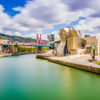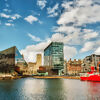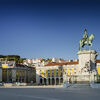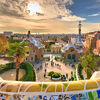26 Nights | EUROPEAN MASTERPIECE
You will visit the following 21 places:

Newcastle upon Tyne
Newcastle upon Tyne, often shortened to Newcastle, is a city and metropolitan borough of Tyne and Wear, in North East England. Situated on the north bank of the River Tyne, the city grew as an important centre for the wool trade and it later became a major coal mining area. The port developed in the 16th century and, along with the shipyards lower down the river, was amongst the world's largest shipbuilding and ship-repairing centres. These industries have since experienced severe decline and closure, and the city today, is largely a business and cultural centre, with a particular reputation for nightlife.

Bilbao
Bilbao is a municipality and city in Spain, a major city in the province of Biscay in the autonomous community of the Basque Country. It is the main urban area in what is defined as the Greater Basque region. Situated in the north-central part of Spain, its main urban core is surrounded by two small mountain ranges. After its foundation in the early 14th century by Diego López V de Haro, head of the powerful Haro family, the city was a commercial hub of the Basque Country that enjoyed significant importance in Green Spain. This was due to its port activity based on the export of iron extracted from the Biscayan quarries. Throughout the nineteenth century and the beginning of the twentieth, Bilbao experienced heavy industrialisation, making it the centre of the second-most industrialised region of Spain. Today, Bilbao is a vigorous service city that is experiencing an ongoing social, economic, and aesthetic revitalisation process, started by the iconic Bilbao Guggenheim Museum, and continued by infrastructure investments, such as the airport terminal, the rapid transit system, the tram line, the Alhóndiga, and the currently under development Abandoibarra and Zorrozaurre renewal projects. Bilbao is also home to football club Athletic Club de Bilbao, a significant symbol for Basque nationalism due to its promotion of Basque players and one of the most successful clubs in Spanish football history.

Belfast
Belfast (meaning: "mouth of the sandbanks") is the capital and largest city of Northern Ireland, the second-largest city in Ireland after Dublin, and is situated around the River Lagan, which runs through the city. It is a port city known as the birthplace of the RMS Titanic, and for its political murals, documenting the ‘Troubles’ of the 20th century. Today, Belfast remains a centre for industry, as well as the arts, higher education, business, and law, and is the economic engine of Northern Ireland. The city suffered greatly during the period of conflict called "the Troubles", but latterly has undergone a sustained period of calm, free from the intense political violence of former years, and substantial economic and commercial growth. Additionally, Belfast city centre has undergone considerable expansion and regeneration in recent years, notably around Victoria Square.

Waterford
Waterford is the oldest city in Ireland famous for its crystal ware and intriguing medieval history. Located on the River Suir, Waterford was once one of the most important European ports in times past. Today, Waterford still maintains its 'small Irish town' feel, and has a much more relaxed vibe than the larger cities, whilst still providing for most traveler's tastes. Appealing most, perhaps, to interests including history, culture, music and arts. Waterford, like most Irish towns, has a lot of pubs.

Admiral Street Police Station (Merseyside Police)
Liverpool is an important city of Merseyside, England. It was founded as a borough in 1207 and was granted city status in 1880. It is a major city famed for culture, football teams, The Beatles and buzzing nightlife. It lies within the historic county boundaries of Lancashire. It is also a large, vibrant city with great cultural heritage and was awarded the title of European Capital of Culture 2008, with the famous Pier Head Waterfront being a UNESCO World Heritage site since 2004.

Southampton
Southampton is the largest city in the county of Hampshire on the south coast of England, and is situated 120 kilometres (75 mi) south-west of London and 30 kilometres (19 mi) north-west of Portsmouth. Southampton is a major port and the closest city to the New Forest. It lies at the northernmost point of Southampton Water at the confluence of the River Test and River Itchen, with the River Hamble joining to the south of the urban area. The local authority is Southampton City Council, which is a unitary authority. Just over a quarter of the jobs available in the city are in the health and education sector. A further 19 per cent are property and other business and the third largest sector is wholesale and retail, which accounts for 16.2 percent. Between 1995 and 2004, the number of jobs in Southampton has increased by 18.5 per cent. Southampton has always been a port, and the docks have long been a major employer in the city. In particular, it is a port for cruise ships; its heyday was the first half of the 20th century, and in particular the inter-war years, when it handled almost half the passenger traffic of the UK. Today it remains home to luxury cruise ships, as well as being the largest freight port on the Channel coast and fourth largest UK port by tonnage, with several container terminals. Unlike some other ports, such as Liverpool, London, and Bristol, where industry and docks have largely moved out of the city centres leaving room for redevelopment, Southampton retains much of its inner-city industry.

Dublin South
Dublin is the largest and capital city of Ireland. The English name is derived from the Irish name Dubh Linn, meaning "black pool". It is a primate city with an urban population of over 1 million, containing almost 25% of the country's population. Dublin is situated near the midpoint of Ireland's east coast, at the mouth of the River Liffey, and at the centre of the Dublin Region. The city is listed by the Globalization and World Cities Research Network (GaWC) as a global city, with a ranking of "Alpha-", placing it among the top thirty cities in the world. It is a historical and contemporary centre for education, the arts, administration, economy and industry.

Lisbon
The capital of Portugal, Lisbon (Portuguese: Lisboa) has experienced a renaissance in recent years, with a contemporary culture that is alive and thriving and making its mark in today's Europe. Perched on the edge of the Atlantic Ocean, Lisbon is one of the rare Western European cities that faces the ocean and uses water as an element that defines the city. Lisbon enchants travellers with its white-bleached limestone buildings, intimate alleyways, and an easy-going charm that makes it a popular year-round destination.

Málaga
Málaga is a large city in the southern Spanish region of Andalucia and capital of the Malaga Province. The largest city on the Costa del Sol, Malaga has a typical Mediterranean climate and is also known as the birthplace of famous Spanish artist Pablo Picasso. The city offers beaches, hiking, architectural sites, art museums, excellent shopping and cuisine. While more laid back than Madrid or Barcelona, Malaga is still the center and transport hub for the hugely popular Costa del Sol region, which is flooded with tourists in the summer, and the city has certainly cashed in on the sun and sand, with lots of new construction as well as hotels and facilities geared to tourists. However, Malaga also offers some genuinely interesting historical and cultural attractions in its old city and its setting on the coast is still beautiful.

Bordeaux
Bordeaux is a port city on the Garonne River in southwest France, with an estimated (2008) population of 250,082. The Bordeaux-Arcachon-Libourne metropolitan area, has a population of 1,010,000 and constitutes the sixth-largest urban area in France. It is the capital of the Aquitaine region, as well as the prefecture of the Gironde department. Its inhabitants are called Bordelais. Bordeaux is the world's major wine industry capital. It is home to the world's main wine fair, Vinexpo, while the wine economy in the metro area moves 14.5 billion euros each year. Bordeaux wine has been produced in the region since the eighth century. The historic part of the city is on the UNESCO World Heritage List as "an outstanding urban and architectural ensemble" of the 18th century.

Barcelona
Barcelona – Spain's enchanting capital, second largest and most populous city. It is a huge city that vibrates with life, and there’s certainly not another city in the country to touch it for its sheer style, looks or energy. It is one of the world's leading tourist, economic, trade fair and cultural centers, and its influence in commerce, education, entertainment, media, fashion, science, and the arts all contribute to its status as one of the world's major global cities. Barcelona is home to masterpieces of many great architects – the most famous of which is Antoni Gaudí.

La Rochelle

Guernsey

Cadiz

Brest

Le Verdon-sur-Mer

Leith

Greenock

Holyhead

Weymouth, England
Weymouth is a seaside town in Dorset, southern England. Its sandy beach is dotted with colorful beach huts and backed by Georgian houses. The city is a tourist resort, and its economy depends on its harbour and visitor attractions; the town is a gateway situated halfway along the Jurassic Coast, a World Heritage Site on the Dorset and east Devon coast, important for its geology and landforms. Weymouth Harbour has included cross-channel ferries, and is home to pleasure boats and private yachts, and nearby Portland Harbour is home to the Weymouth and Portland National Sailing Academy, where the sailing events of the 2012 Olympic Games and Paralympic Games were held.










